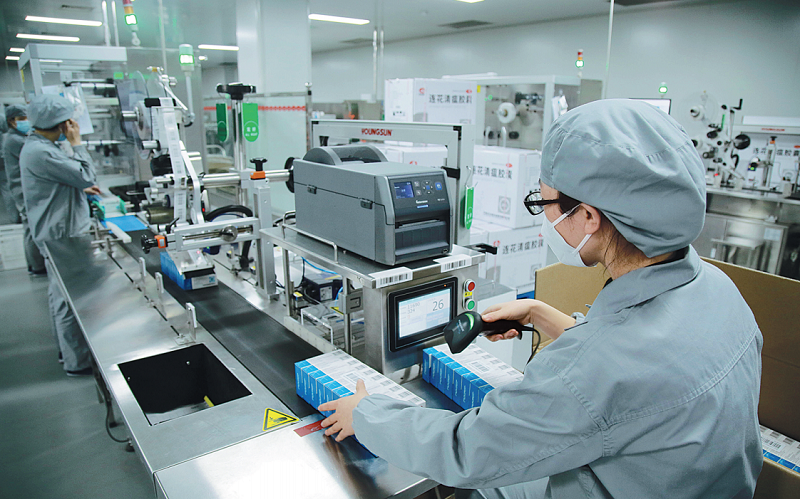Deputy urges TCM to embrace cutting-edge technology

Employees work on a production line making Lianhua Qingwen, a TCM product, at a Shijiazhuang Yiling Pharmaceutical Co facility in Hebei province. [Photo/Xinhua]
Tianjin Party chief tells NPC deputies that innovation is indispensable
Traditional Chinese medicine must embrace modern technologies to achieve innovative development, Zhang Boli, a TCM expert, said on Wednesday.
Zhang, honorary president of Tianjin University of Traditional Chinese Medicine, is a deputy to the 14th National People's Congress, the country's top legislature, which is meeting in Beijing this week.
He told a meeting of fellow legislators in the Tianjin delegation that the laboratory where he works has stored more than 60,000 active ingredient samples of TCM extracts on campus, making it the world's largest such bank and a boon to research.
His team has leveraged big data and other advanced manufacturing technologies to make TCM more effective and uncover how it works in people's bodies.
"Age-old things do not necessarily symbolize backwardness," said Zhang, also an academician at the Chinese Academy of Engineering and honorary president of the China Academy of Chinese Medical Sciences.
"However, the restraint of old-fashioned medicine-making methods must be broken if TCM wants to excel."
Zhang said his team, a front-runner in digitalizing TCM production, has rolled out several intelligent TCM production lines that have revolutionized the TCM industry.
"We've also created a school on campus focusing on TCM pharmaceutical engineering, and have trained thousands of TCM engineers," he said.
Citing official figures, Zhang said the emerging health service industry in China was worth 8 trillion yuan ($1.1 trillion) in 2020, including 3 trillion yuan worth of TCM-related services.
"China has two sets of medical sciences to help safeguard people's health, and the two have their own respective advantages," he said.
"They are highly complementary and cannot replace each other."
Central authorities issued a guideline in 2016 on promoting public health, which said that by 2030, TCM shall work in synergy with Western medicine in treating major diseases, and play a central role in patients' recovery.
Zhang said his team has helped bring TCM to the world by collaborating with pharmaceutical companies and has registered TCM products as prescription drugs, healthcare products or food additives in 16 countries and regions, including the United States, the European Union, Canada and Australia.
Speaking at the meeting, Chen Min'er, a member of the Political Bureau of the Communist Party of China Central Committee and Party chief of Tianjin, said that innovation is crucial if ancient therapies are to continue serving contemporary Chinese people.
He drew parallels between TCM and other legacy industries such as steel, electric power and fossil fuels. "For such sectors to become more productive, innovation is indispensable," he said.
- Top legislature schedules standing committee session for late February
- China's top legislator meets with Uruguayan president
- Senior legislator surveys Anhui on formulating outline of provincial 15th Five-Year Plan
- China's top legislator meets with British PM
- NPC deputies see more engagement with top court



